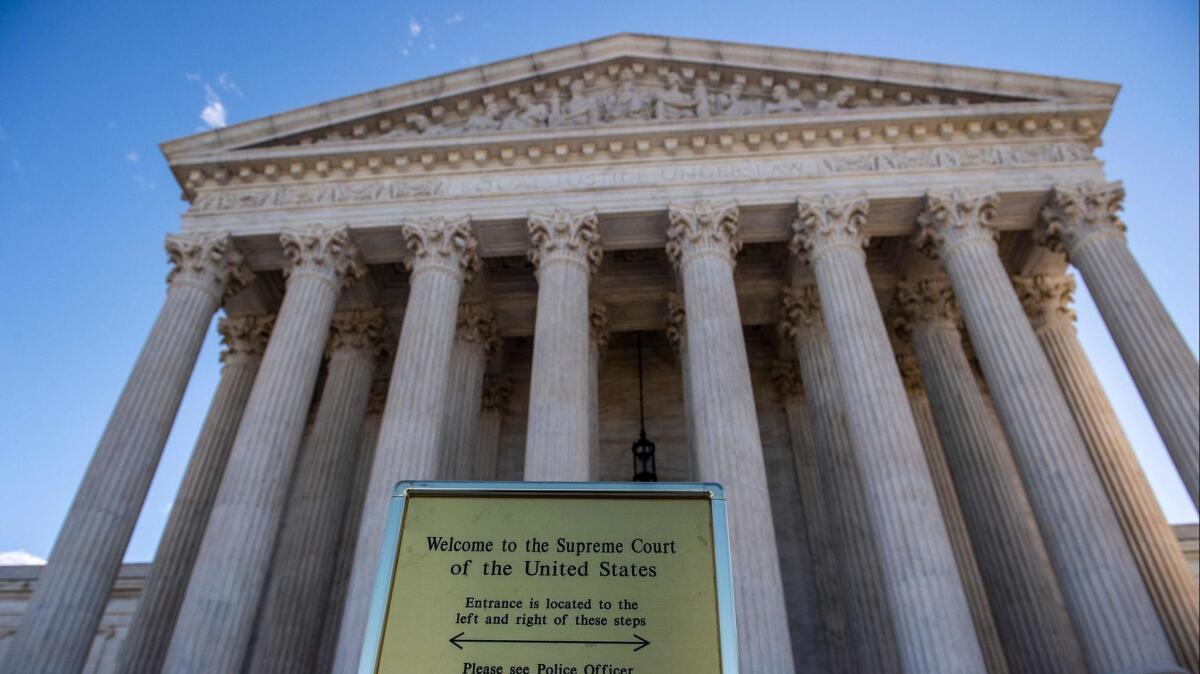Op-Ed: Has the Supreme Court become a rubber stamp for Trump? It’s starting to look that way

- Share via
Will the conservative Roberts court be willing to check President Trump when his policies run afoul of the law? Or will it effectively be a rubber stamp approving the administration’s actions? The initial indications have been discouraging, and Tuesday’s oral arguments in a case involving the 2020 census suggest that the court is likely once again to approve a Trump administration policy that has no basis in law.
Last June, the Supreme Court decided its first case involving a major challenge to a Trump policy, the travel ban. The president began trying to bar travelers and immigrants from certain countries just a week after he took office. The seven countries in his initial executive order on the subject shared three things in common: All were majority Muslim, none had been linked to terrorist acts in the United States, and all were countries in which Trump had no economic investments. Later iterations of the ban, issued in response to court rulings, tinkered with who was affected and how it would be implemented, but Muslims were still the primary targets.
As a candidate and as president, Trump had repeatedly said he wanted a ban on Muslim immigration to the United States. The law is clear and emphatic that the government violates the Constitution when it acts with animus against a religion. Every federal court of appeals and almost every federal district court to consider the Trump policy declared it unconstitutional.
The conservative justices on the Roberts court, including its two Trump appointees, have yet to stand up to the Trump administration at all.
But the Supreme Court, in a 5-4 decision, with the five conservative justices in the majority, upheld the Trump policy and proclaimed the need for deference to the president in matters of immigration. Never before had the Supreme Court upheld such blatant religious discrimination.
The questions and comments of the conservative justices at Tuesday’s oral arguments in Department of Commerce vs. New York made it difficult to maintain hope that the travel ban case was an aberration and that the Supreme Court might stand up to the Trump administration on other issues.
The Constitution requires a regular census every decade to ensure an accurate “enumeration” of the people. Being as accurate as possible in the count is crucial because seats in the House of Representatives are allocated based on the census and many federal programs apportion money based on it as well.
The Department of Commerce, which administers the census, added a question for the 2020 census about whether a person is a citizen. A question on citizenship has not been standard on the form since 1950, and there has long been concern that restoring the question would deter some people from submitting the form.
The state of New York, as well as a number of organizations, challenged the inclusion of a citizenship question on 2020 census questionnaires. They contended, with strong evidentiary support, that individuals in the country illegally and even documented noncitizens would be much less likely to participate in the census.
Federal district courts that considered the challenges ruled against the Trump administration, on grounds that decisions of administrative agencies must have a reasonable basis, and there were no reasonable justifications for changing the policy to include the question on citizenship. Moreover, the federal district courts ruled that asking about citizenship was likely to prevent the accurate enumeration of the population required by the Constitution.
Enter the Fray: First takes on the news of the minute »
This should be an easy case for the Supreme Court. The Trump administration initially offered no reason for the change, but then said it was to aid in enforcement of the federal Voting Rights Act of 1965. There is no evidence, however, that enforcement of that act for the past 54 years has been hindered in any way by the absence of this question on the census. Indeed, as was pointed out at the oral argument, there was no evidence within the Justice Department that asking this question on the census would do anything to help enforce voting rights.
As Justice Elena Kagan said at Tuesday’s oral argument, the change in the census questions was a “solution in search of a problem.” Initially the Justice Department and the Department of Homeland Security said that they did not need a question about citizenship, only for the Justice Department to later relent and invent the voting argument.
A crucial function of the Supreme Court is checking the other branches of government, including the president. But the conservative justices on the Roberts court, which includes two Trump appointees in Neil M. Gorsuch and Brett M. Kavanaugh, have yet to stand up to the Trump administration at all. I hope I am wrong, but Tuesday’s oral arguments indicate another 5-to-4 decision split along ideological lines with the five Republican appointees lining up behind their Republican president.
Erwin Chemerinsky is dean of the UC Berkeley School of Law.
More to Read
A cure for the common opinion
Get thought-provoking perspectives with our weekly newsletter.
You may occasionally receive promotional content from the Los Angeles Times.






